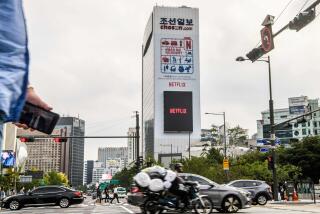South Koreans want their sub-TV
- Share via
SEOUL — Lee Suk-hee can stomach much of the belt-tightening that South Korea’s gasping economy has asked of her, including fewer shopping sprees and more nights eating dinner at home.
But here’s where the 47-year-old homemaker draws the line: Don’t try to take away the free reality TV she watches on her cellphone while riding the subway every day.
“I bought this cellphone to watch television,” she said during one recent underground trip. “I’d feel really bad if it went away.”
It may. Reeling from declining ad revenue and mounting debt from providing the expensive service at no additional cost to subscribers, South Korean cellular operators may soon cancel subway TV coverage that has yet to turn a profit.
Losing underground TV reception may not seem like much to consumers in the U.S., where many are still struggling with cellular dead zones and where a switch to full above-ground digital TV service may leave millions staring at useless analog sets.
But for many South Koreans, subway TV has become a familiar part of their daily routines. Phone companies in this digitally crazed nation in 2005 were the first to launch mobile TV that could be tuned in on phones just about anywhere -- even in the subway tunnels deep beneath Seoul and other cities.
Today, nearly 10 million cellular users are watching soap operas, sports and sitcoms on a special frequency dedicated to portable viewing -- enjoying it all on larger digital-quality screens and high-tech handsets to improve reception.
In Seoul, for example, companies offer eight video and 10 audio channels on new cellphones. There’s also a subscription-based satellite service, but few consumers have shelled out for it.
But the proposed changes by cellphone service providers would leave users with only static in the subway, and no TV signal until they hit street level again.
“It’s tough. We would love to do this business; however, we don’t have the money now,” said an official for the union that represents TV content providers, who asked not to be named.
He said the South Korean government should help fund the service in a sort of U.S.-style government bailout. “It is up to our government,” he said. “Service on the subway is a public issue.”
Cellphone channel-surfing skyrocketed in South Korea during the 2006 World Cup soccer matches. Throughout last year’s Beijing Olympics, subway riders crowded around the portable TV screens of fellow passengers for a look.
The service is made possible by so-called transmission network gap fillers that relay signals underground. But each of the half-dozen cellular providers says the service has become too expensive.
In a struggling economy, the providers say, the $250,000 annual fee each pays subway companies for the service is a make-or-break amount.
In a competitive market, it’s better to do away with subway TV than ask subscribers to pay for it. The possibility of dropping it all together -- once considered remote -- is now on the table, they say.
Meanwhile, some South Koreans are watching more than two hours of TV a day on their cellphones, and government officials predict that TV-capable phones will soon be as ubiquitous as camera phones are now.
Young tech-savvy consumers here remain hungry for new electronic gizmos. Research shows that South Korean youths replace their cellphones every 11 months. One in three students sends 100 text messages a day. And 97% of cellphone users purchase vanity ring tones from the Internet.
But as the unemployment rate soars, it’s uncertain whether cellphone users will reach further into their pockets to pay for subway TV.
On his afternoon subway commute, aboard a train crowded with glum-faced salary men and grandmothers with grocery bags, Kim Tae-woo laughed at a variety TV show. The 16-year-old student said it would be hard to get along without a service he has come to prize.
“I’d be pretty annoyed,” he said. “I wouldn’t be able to watch TV anymore. That’s too bad.”
--
--
Ju-min Park of The Times’ Seoul Bureau contributed to this report.
More to Read
Sign up for Essential California
The most important California stories and recommendations in your inbox every morning.
You may occasionally receive promotional content from the Los Angeles Times.











